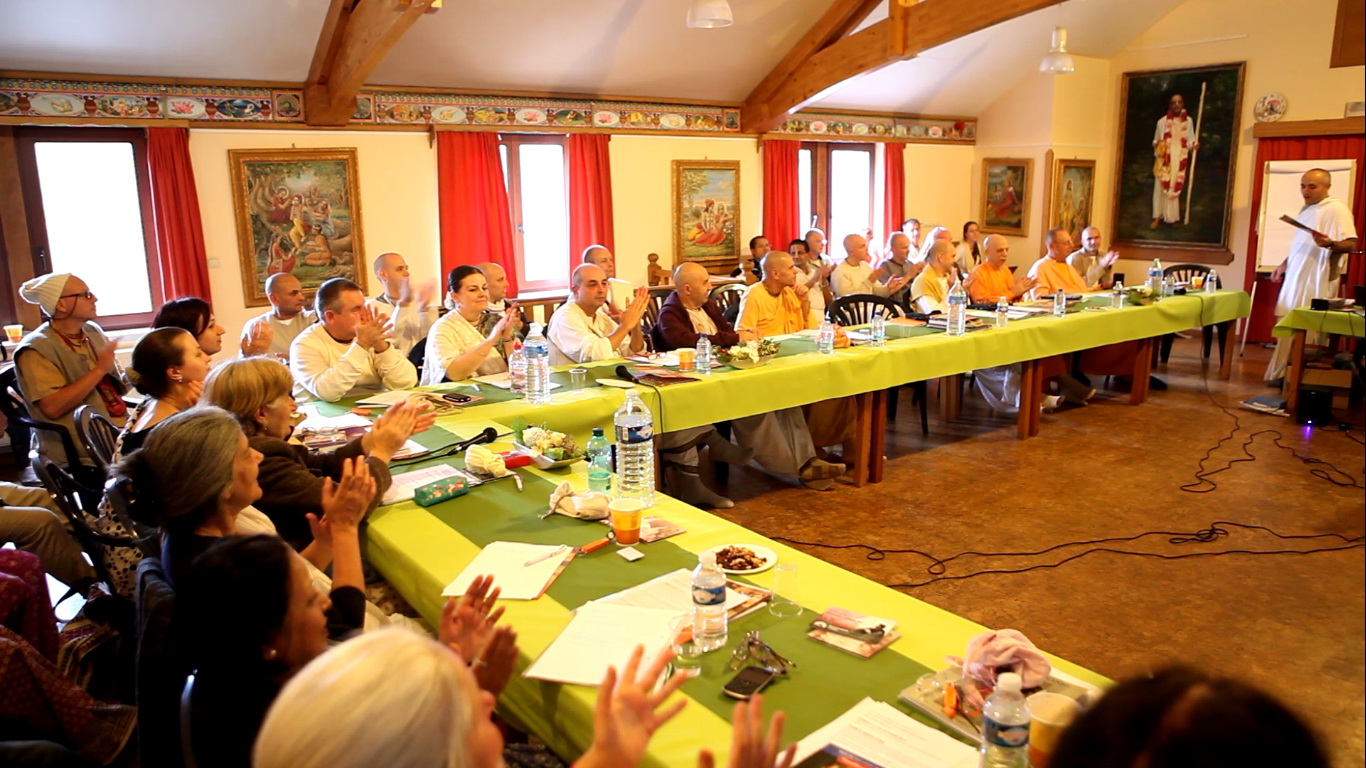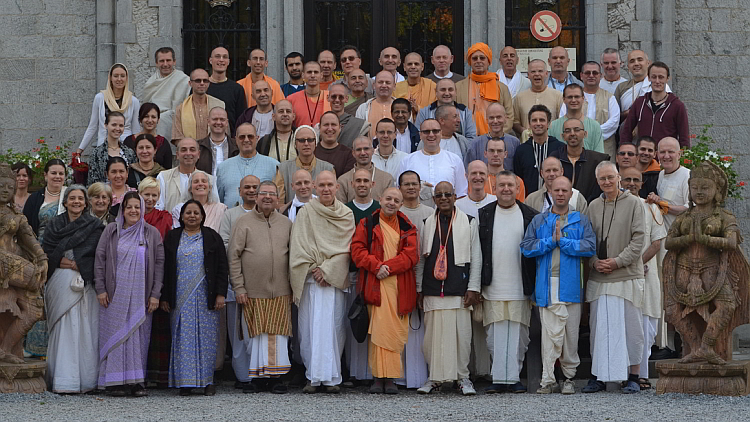European Leaders Discuss Milk: To Drink or Not to Drink?
By Madhava Smullen | Nov 09, 2013

At the annual European Leaders’ Meetings from October 5th to 6th this autumn, ISKCON leaders from all over Europe had a fascinating discussion on a very current and often controversial topic: whether or not to drink milk.
Nearly eighty devotees traveled from France, Spain, Ireland, England, Scotland, Hungary, Croatia, Germany, Sweden and Holland to attend the meetings, which were held this year in Radhadesh, Belgium.
Twenty-five of these devotees were members of the Euro Regional Governing Body, which consists of global GBC members stationed in Europe.
The remaining fifty or so devotees were members of the 200-strong European Leaders’ Body, which consists of temple presidents, Namahatta group leaders, book distribution party leaders, Child Protection Office directors, and educators from ISKCON communities all over Europe.
Their discussion on Traditional Vaishnava Diet: Milk in ISKCON began at 11:15am on Saturday October 5th.
Milk is currently a hot topic in the world in general, with animal rights lobbyists becoming more and more outspoken, and often advocating a vegan diet due to the cruelty inflicted on Mother cow in the dairy industry. An increasing amount of ISKCON devotees are also beginning to join this viewpoint.
“It is a very relevant and very challenging topic,” says Euro RGB secretary Dinadayal Das. “These days we as a society are asked all too often where we get our milk — from slaughterhouses, from farmer-owned cows, or from our own cows? And unfortunately we often cannot say that we are getting milk from protected cows. How do we, a society that is preaching such high truths, deal with this?”
The European Leaders Meetings (ELM) approached the topic by inviting two devotees to make half-hour presentations on it from different points of view.
The GBC’s Global Food for Life Minister Priyavrata Das spoke first, saying that although milk is a pure, sattvic food recommended for Vaishnavas, milk from today’s commercial dairies is poison, packed with chemicals and hormones. Not only that, but milk cows are kept in horrific conditions, tortured and murdered after only two or three years. Some never see the light of day.
Priyavrata Dasa’s full presentation
Opining that purchasing commercial milk supports the slaughter industry, Priyavrata suggested that ISKCON instead create its own milk production from protected cows. Failing that, he suggested that ISKCON temples could approach organic farmers and sponsor cows for their milk with the condition that the cow is never killed — which, interestingly, is how the Ahimsa milk project in the UK is run.
Priyavrata pointed out that there were some ISKCON projects that were already producing Ahimsa milk, and that there was a demand for such a product not just in ISKCON but in the wider world too.
ISKCON’s Gita Nagari farm in Pennsylvania, USA, for instance, now produces 200 to 300 gallons of cruelty-free milk weekly. While the cost is naturally much higher than what we’re used to paying supermarkets — it comes at $10 a gallon — it doesn’t stop those who believe strongly enough in the principle: Gita Nagari recently received $300,000 in donations from the public for its program.
Concluding his presentation, Priyavrata clarified, “I am not a Vegan, I am a Krishna-Dairian, and I have been like that for fifteen years. I do believe milk in its pure form is very enriching and very good for us. But I’ve made a personal choice that I will only drink milk when it’s coming from protected and loved cows. And I believe that that would be a good policy for the institution [ISKCON] to adopt. I think it’s proactive, positive, great public relations, and I think people would really appreciate us if we did that.”
ISKCON Europe Cow Protection Minister Shyamasundara Das spoke next, posing the question: “Is anything different today than in Srila Prabhupada’s day which suggests that we should change our stance on milk consumption?”
Shyamasundara Dasa’s Presentation (Power Point slides only)
He suggested that there wasn’t, saying that Prabhupada was aware of what happens in modern milk production when he recommended devotees drink milk, and that cows are treated no worse today than they were in the 1970s. In fact, due to tighter legislation, milk is actually healthier today.
Shyamasundara listed many quotes from Prabhupada on the importance of drinking milk for nutritional and spiritual reasons, and said that we should not stop drinking it.
Speaking to ISKCON News later, he said, “Veganism is cow protection as much as not having children is stopping abortion. In other words, it’s not a solution.”
So what is the solution? Here, Shyamasundara agreed with Priyavrata. He said that devotees were embarrassed when preaching to today’s vegan-lobby-influenced crowd because they had not fulfilled the other important part of Prabhupada’s instructions on milk: to produce their own from protected cows.
He pointed out that most ISKCON farms have stagnated or declined since Srila Prabhupada was with us, and said that devotees should now take the opportunity to give the right example to society.
At the practical level, Shyamasundara explained, the issue shifts from a moral one to one of economics. With cow care and human worker compensation figured in, the reality is that milk from protected cows costs six times the price of store-bought milk.
Most ISKCON temples say they don’t have the money. But Shyamasundara advocated that ISKCON leaders should preach the importance of accepting the price of protected cow milk.
“Our message is that we want people to produce milk without killing cows,” he says. “And that means that we have to be willing to pay for it. If our ISKCON leaders said, ‘In five years time, we want to create a society where all the milk for all our main temples comes from protected cows,’ I think they could do it.”
He encouraged ISKCON’s extremely successful and financially secure Indian temples to establish cow protection projects for all their dairy needs. “That would make a massive statement to the government of India and to all of ISKCON,” he said.
Meanwhile, he suggested that rank and file devotees could do their part by financially supporting their local goshala.
Like Priyavrata, he also raised the option of sponsoring cows at local organic farms, and thus saving their lives.
Of course, for some of us even that may be difficult — and this raises the point that there are many levels of action or lifestyle change in between drinking milk only from protected cows, and drinking “slaughter-milk.” Possibilities include purchasing organic milk from a local farmer, or at least purchasing organic milk at the store and offering it to Krishna to give the cows as much spiritual benefit as possible.
Following Shyamasundara, special guest Sitarama Das presented his UK-based project the Ahimsa Dairy Foundation, which works in cooperation with a local organic dairy. The herd of cows sponsored by Ahimsa are cared for for life, graze freely and are never slaughtered.
Sitarama Dasa’s Presentation (Power Point slides only)
This presentation was followed by an hour-long plenary session in which all the ISKCON leaders present were surveyed, with interesting results.
Sixty-four per cent voted, “We will source better qualities of milk;” twenty-three per cent said, “We will completely avoid milk and dairy products;” and thirteen per cent chose “We will reduce our milk consumption generally;” while not one person voted for, “We will continue with the current status quo.”
“Devotees clearly expressed that they do not want to continue to buy the cheapest milk from the shops as they do now,” comments Euro RGB secretary Dina Dayal. “At least from my perspective, that’s quite a revolutionary statement.”
Perhaps even more surprising is the fact that despite Shyamasundara ruling out veganism as a solution, one quarter of the European ISKCON leaders present stated that if they could not have milk from protected cows, they would not drink milk at all.
Overall, however, everyone agreed to focus on establishing cow protection with greater determination in ISKCON.
“We deplore the slaughter of cows and regard it as completely unnecessary for the dietary requirements of human society,” the European Leaders said in a statement released after the meetings.
“We commit ourselves to a future when ISKCON’s self-sustaining communities and/or slaughter-free farms are able to provide the milk requirements of our ISKCON communities and projects.”
The Leaders also clarified, “Our preference will always be a lacto-vegetarian diet, in accordance with the teachings of Srila Prabhupada.”

Nearly 80 European ISKCON Leaders Gather for ELM 2013















